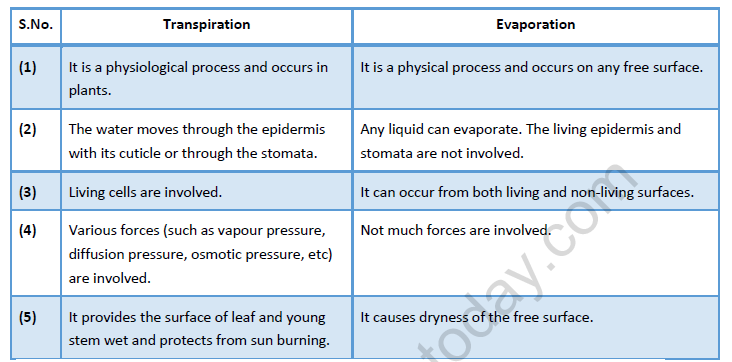(d) Leaves become turgid and expand due to their OP.
(e) Growing points of root remain turgid because of osmosis and are thus, able to penetrate the soil particles.
(f) The resistance of plants to drought and frost is brought about by osmotic pressure of their cells.
(g) Movement of plants and plant parts, for example, movement of leaflets of Indian telegraph plant, bursting of many fruits and sporangia, etc. occur due to osmosis.
(h) Opening and closing of stomata is affected by osmosis.
(4) Turgor pressure (TP)
The plant cell, when placed in pure water, swells but does not burst. Because of negative osmotic potential of the vacuolar solution (cell sap), water will move into the cell and will cause the plasmalemma be pressed against the cell wall.
(5) Wall pressure (WP)
Due to turgor pressure, the protoplast of a plant cell will press the cell wall to the outside. The cell wall being elastic, presses back the protoplast with a pressure equal in magnitude but opposite in direction. This pressure is called wall pressure. Wall pressure (WP) may, therefore, be defined as 'the pressure exerted by the cell wall over the protoplast to counter the turgor pressure.
(6) Plasmolysis (Gr. Plasma = something formed; lysis = loosing)
If a living plant cell is placed in a highly concentrated solution (i.e. hypertonic solution), water comes out of the cell due to exosmosis, through the plasmamembrane. The loss of water from the cell sap causes shrinkage of the protoplast away from the cell wall in the form of a round mass in the centre. "The shrinkage of the protoplast of a living cell from its cell wall due to exosmosis under the influence of a hypertonic solution is called plasmolysis".
(7) Water potential (y)
The movement of water in plants cannot be accurately explained in terms of difference in concentration or in any other linear expression. The best way to express spontaneous movement of water from one region to another is in terms of the difference of free energy of water between two regions. Free energy is the thermodynamic parameter that determines the direction in which physical and chemical changes must occur. The potential energy of water is called water potential. e.g., water is stored behind a dam.
(8) Differences between diffusion pressure deficit and water potential
(9) Differences between active and passive absorption of water
(10) Differences between transpiration and evaporation

(11) Types of stomata
On the basis of orientation of subsidiary cells around the guard cells, Metcalfe and Chalk classified stomata into following types :
(i) Anomocytic : The guard cells are surrounded by a limited number of unspecialised subsidiary cells which appear similar to other epidermal cells. e.g., in Ranunculaceae family.
(ii) Anisocytic : The guard cells are surrounded by three subsidiary cells, two of which are large and one is very small. e.g., in Solanaceae and Cruciferae families.
(iii) Paracytic : The guard cells are surrounded by only two subsidiary cells lying parallel to the guard cells e.g., Magnoliaceae family.
(iv) Diacytic : The guard cells are surrounded by only two subsidiary cells lying at right angles to the longitudinal axis of the guard cells. e.g., Acanthaceae and Labiatae families.
(v) Actinocytic : The guard cells are surrounded by four or more subsidiary cells and which are elongated radially to stomata.
(12)Differences between transpiration and guttation
MineralNutrition
(1) Macronutrients (Macroelements or major elements): Nutrients which are required by plants in larger amounts (Generally present in the plant tissues in concentrations of 1 to 10 mg per gram of dry matter).
(2) The macronutrients include carbon, hydrogen, oxygen, nitrogen, phosphorous, sulphur,potassium, calcium, magnesium.
(3) Micronutrients (Microelements or minor elements or trace elements): Nutrients which are required by plants in very small amounts, i.e., in traces (equal to or less than 0.1 mg per gram dry matter).
(4) The micronutrients include iron, manganese, copper, molybdenum, zinc, boron and chlorine.Recent research has shown that some elements, such as cobalt, vanadium and nickel, may be essential for certain plants.
(5) The usual concentration of essential elements in higher plants according to D.W. Rains (1976) based on the data of Stout are as follows:
Major Role of Nutrients
Various elements perform the following major role in the plants:
(1) Construction of the plant body: The elements particularly C, H and O construct the plant body by entering into the constitution of cell wall and protoplasm. They are, therefore, referred to as frame work elements. Besides, these (C, H and O) N, P and S also enter in the constitution of protoplasm. They are described asprotoplasmic elements.
(2) Maintenance of osmotic pressure: Various minerals present in the cell sap in organic or inorganic form maintain the osmotic pressure of the cell.
(3) Maintenance of permeability of cytomembranes: The minerals, particularly Ca++, K+ and Na+ maintainthe permeability of cytomembranes.
(4) Influence the pH of the cell sap: Different cations and anions influence on the pH of the cell sap.
(5) Catalysis of biochemical reaction: Several elements particularly Fe, Ca, Mg, Mn, Zn, Cu, Cl act as metallic catalyst in biochemical reactions.
(6) Toxic effects: Minerals like Cu, As, etc. impart toxic effect on the protoplasm under specific conditions.
(7) Balancing function: Some minerals or their salts act against the harmful effect of the other nutrients, thus balancing each other.

